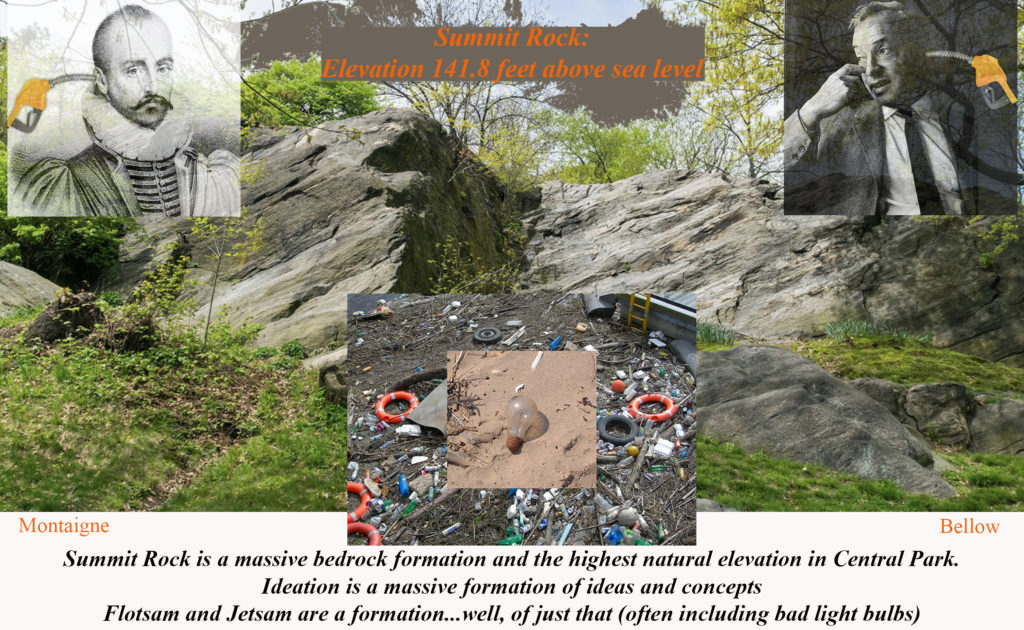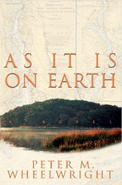
Saul Bellow once said: “People don’t realize how much they are in the grip of ideas. We live among ideas much more than we live in nature.“
I say: Well, yes and no…
Few would deny that we spend a great deal of time inside our heads (see Lyle Lovett in Ruminations 29…). Ideas are the fuel we run on, after all; how else could we put one foot in front of the other to propel ourselves along.
Skulls are fuel tanks. Inside are the good ideas that we try to hold on to; think of them as …well, sustainable. Then, there are the bad ideas that, if we hold on to them too long, go down with the wreckage like flotsam.
Think of bad ideas as crude oil. Better to go the way of jetsam – toss out the bad ideas before your existential ship sinks.
Too many metaphors and similes? Can’t help it; just trying to hook up disconnected things. Besides, now you know the difference between flotsam and jetsam.
My point here is that ideas allow us to move through the world. But, also, that it works both ways. The world is the sine qua non of ideation. Ideas are always situated in particular places in the world and at particular moments in time – in a context, so to speak, that gives ideas their sense.
Which brings me to Bellow’s “nature.”
I am not 100% sure what he meant by the word. After all, he was by…er, nature, a city fellow – New York, Chicago, mostly. But in his last years, he spent a lot of time in southern Vermont, and there is a lot of uppercase “Nature” there. Maybe he changed his mind before laying himself down in the Shir Heharim Cemetery in Brattleboro.
But, either way, it begs the question: what about ideas about nature?
I think a lot about Nature and The Door-Man is full of ideas about it. For example, this bit of ideation on Summit Rock in Central Park.
…He remembered sitting on the gray rock that emerged from the grass-covered hill’s summit like a shaved tonsure, and he remembered the far and the near. The tops of the trees, spreading away from his sister and himself, surrounding the distant reservoir like a soft quilt of multi-hued green with its mixed fragrance, as if each different shade of green was woven with its own earthy scent; and at his fingers, the feel of the rock where he traced its seams and palmed the soft cushions of moss that had taken hold in its weathered rivulets…
He had been just a boy on a rock. The briefest hot spark of all. One small beating heart, there, soon gone; but not before feeling in that very heart the subtle urgency in the indifferent, imperceptible, and inexorable drift of continents, the herculean press of tectonic plates into new arrangements, and the surge, like the vast swells of ocean waves, of mountain ranges born on the eroded remains of ancient ones slipping quietly into the seas where the dark abysses widened…
Five years later, when Franklin Roosevelt lowered the age to seventeen for enrollees into the Civilian Conservation Corps, Livingston Goldring left the city, from the world where he had been raised, and headed out as Livingston Kinsolver to the country, to the earth where he had been born. In all ways, it was a return home; there was more family waiting for him, and the family he was leaving behind had not been true...
It was Montaigne who once said: “Let us permit nature to have her way. She understands her business better than we do.” This rings true, but it doesn’t mean we can’t try to figure out the ideas She has in mind.
After all, pace Bellow*, that’s where we live…inside Nature’s head. And, always have.
*Here’s another lesson – never hang a writer out to dry on a single utterance unless you’re fairly sure they’ll enjoy the breeze on the clothesline.
Return to Ruminations







